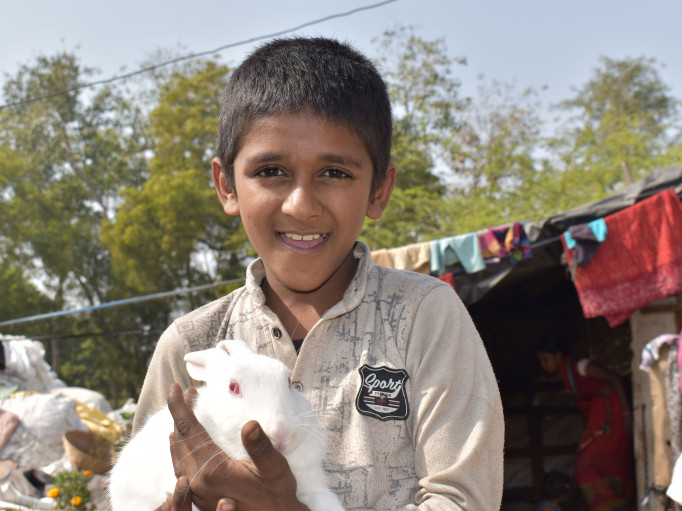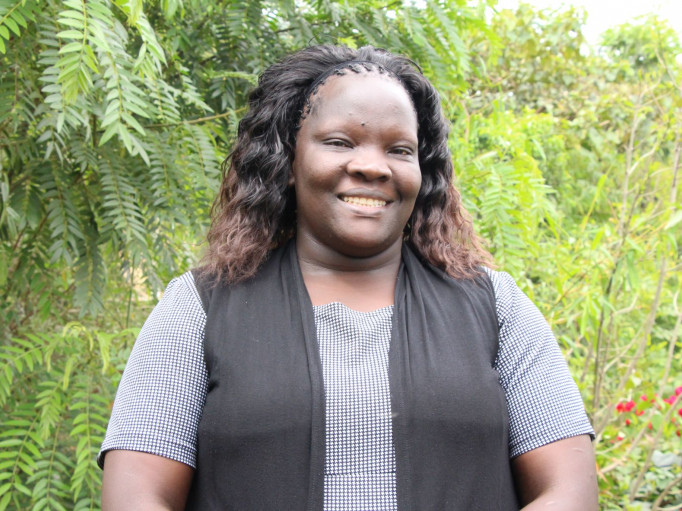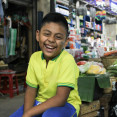
When everything else in a street child’s life is falling apart, pets can show the love and affection they may never have experienced before. For children living on the fringes of society, companionship plays a key role in supporting their wellbeing and mental health. While children often form strong friendships with others they encounter on the streets, in many cases, it can be a child’s connection with a pet that offers the greatest comfort. Many children who are forced to live or work on the streets have escaped unimaginably abusive home lives, yet a life on the streets can be equally unpredictable and dangerous. Stray animals are often adopted by children who go on to form special and unique bonds with these animals, who quickly become their pet. Toybox partners have seen first-hand the positive impact that pets can bring for street children.
As Esther Mwangi, from PKL (pictured below) explains,
“In Kenya, owning a pet is perceived as a preserve of the rich because buying and caring for an animal that does not bring financial benefits is seen as counterproductive. The therapeutic impact of pets is always seen as a western concept and less appreciated. But, among the street connected children (specifically boys), this has been a little different. Dogs have been embraced as pets and have become members of their bases*. Since street connected children often feel ostracised by the society, they tend to feel that they share a similar fate with stray dogs and seem to form a strong bond with them. Some pets are group pets (cared for by the entire base) and some are individual pets, where the child specifically assumes overall responsibility for their pet. Children who own pets in the bases have exhibited a higher level of kindness and care. They are more protective of younger children in the bases. One child reported being less lonely when he is with his pet because he can talk to the pet and the pet can give him company wherever he goes.”
The positive impact that a pet can make to a street child’s well-being is remarkable. Esther continues,
“A few children who own pets have shown a reduced intake of drugs. They report that when playing with their pets they feel happier and do not feel stressed, and therefore they use drugs less, since they mostly turn to drugs when stressed. Generally, pets have been seen to give the children some sort of a purpose bigger than them as they feel the pets look up to them for care, protection and food and they must ensure they measure up to this expectation. This tends to make them happier and feel a sense of achievement.”
*Children on the streets in Nairobi live with peers/family in groups in open spaces they identify as safe. These ‘bases’ are normally located in unused public spaces such as flyovers or disused land.

Naomi Hall Opiyo, Toybox's Director of Impact and Programmes (pictured below) shares her thoughts on the role pets have played in the lives of street children during the pandemic.
“Neither ourselves or our partners explicitly encourage pets to promote or enhance children’s wellbeing. As any pet owner knows, the task comes with responsibility - a time and financial cost to ensure the animal’s wellbeing which is not always easy- or possible. However, as these stories illustrate- and as our own or children’s experiences of looking after pets may have taught us- it can have huge positive benefits emotionally, mentally and even physically. For children with so few material possessions, so little consistency and a life of hardship, trauma and abuse- a pet can provide that unconditional love and friendship they may never have known. A pet may also help them to love and care for others when they haven’t experienced it for themselves. In the past six months, myself and my colleagues have been fortunate to have been travelling again to some of the cities where Toybox works. Each of us came back from different countries with stories of the companionship which was evident between children and their pets (mainly dogs). Given the loneliness and additional stress experienced during the pandemic, these furry friends have been more important than ever. There is also something very special about the way children and their dogs “choose” each other as their companion – both homeless, abandoned and searching the streets for food but feeling safe and secure in each other’s company. These friendships haven’t needed Toybox or our partners to make possible but they have given some stability for children to engage in complementary interventions such as education and counselling.” Naomi Hall Opiyo, Director of Impact and Programmes.




